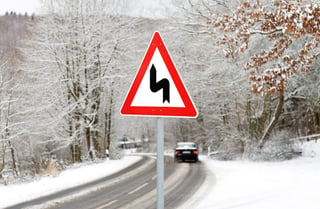9 Winter Driving Mistakes That Could Increase Your Car Insurance Premium
Jennifer D'Agostino
 You never know if the winter season is going to be stormy or mild, but even with the slightest hint of the frozen stuff, it's important to take extra precautions.
You never know if the winter season is going to be stormy or mild, but even with the slightest hint of the frozen stuff, it's important to take extra precautions.
A Dangerous Combination
A few short years back there was a small amount of snow, followed by rain, then a drop in temperature. An insured was driving into work early one morning and the radio announcer warned of something called black ice. As he pulled into the parking lot, he tried to turn his truck into a parking space and plowed right into the back of a parked car. Even though he was only doing 5 MPH, there was substantial damage.
Insurance Companies Look at Winter Accidents When Reviewing Your Driving Record
Even though there is only a small amount of snow and ice on our roads, insurance companies will look at winter accidents when reviewing your driving record. It's important to realize that your actions can have a financial impact on your auto insurance premiums long after the ground has thawed.
So, if you want to prevent an increase in your car insurance premiums (and the stress that goes along with an accident) don't make these 9 winter driving mistakes:
- Leaving last-minute even though you know the road conditions could be dangerous. You should allow yourself plenty of extra travel time during winter months to account for the road conditions. Trips can take longer with snow and icy roads.
- Driving too close behind the car in front of you. Leave more distance between you and the car ahead of you, giving yourself at least 10 extra seconds to come to a complete stop.
- Driving fast. On ice-covered roads it takes much longer to stop and turn, and the faster you're going the harder it's going to be to avoid a potential accident.
- Thinking if the road is clear, a bridge will be too. Bridges and roadways rarely exposed to sunlight are more prone to ice than other areas.
- Stopping suddenly and changing lanes quickly. Driving in this manner isn't recommended even when road conditions are good, and it can turn disastrous in wintry conditions.
- Driving with a near-empty gas tank. You should always keep the gas tank full in winter months. Stormy weather or traffic delays may force you to change routes or turn back. A full tank can also help prevent your car's gas line from freezing.
- Driving before the windshield and windows have defrosted, or without removing snow from your car. Keep a snow brush and scraper in the car at all times so you are always prepared. If you don't, you could wind up paying a fine and endangering other drivers. NJ law requires all motorists to make a reasonable effort to remove all snow and ice from their vehicles.
- Using cruise control. If you think the road surface could be slippery, you should not use cruise control. You want to be completely alert and ready to make decisions quickly if needed.
- Not checking to make sure your exhaust pipe is clear. A blocked pipe could cause a leakage of carbon monoxide into the car.
Safe drivers adjust their driving style based on road conditions. So, if you always put your safety and the safety of others in the forefront, you'll not only be safer, but your auto insurance bill should not have any unanticipated surprises.
GET STARTED WITH A FREE CONSULTATION
Creating a custom insurance or benefits package is critical for companies of all sizes.